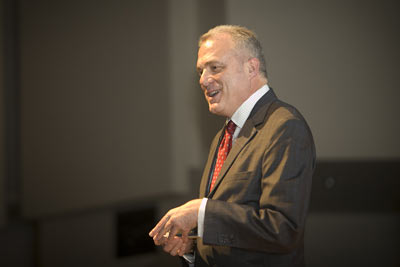Aetna CEO: Technology can improve health care system
By Sherrie Negrea

Technology is the key to making the health care system easier to use and affordable for all, said Mark T. Bertolini, MBA '84, chairman, CEO and president of Aetna Inc., in calling for a restructuring of the way the nation's health care system is managed. He presented the 24th Durland Lecture -- the Samuel Curtis Johnson Graduate School of Management's most prestigious speaking engagement -- at Cornell April 5.
As head of one of the nation's largest health insurance companies, Bertolini said that the health care system today is not working because consumers, doctors, hospitals and insurance companies are all "pursuing their own interests."
"It would be great if we were working together on a common business model, but the way the system works today, it's much like a hockey team where everyone has a puck," said Bertolini, who became Aetna's CEO in 2010 and chairman in 2011.
As part of an effort to make health care simpler and more convenient, Aetna has developed CarePass, a digital platform that will enable consumers to share information, including medical, fitness, insurance and nutritional data, across mobile applications as they specifically permit. Bertolini noted that he thought of the idea for the platform while buying his daughter a sweater using a smartphone and Google Shopper. The platform also includes iTriage, a free, mobile health care app that allows consumers to research their symptoms, find a medical care provider and book an appointment from a smartphone. Already, more than 5 million Americans use the iTriage app.
Bertolini drew on his personal experiences with the health care system to illustrate his understanding of the problems the industry faces. His first life-changing event came in 2001, when his son, Eric, was diagnosed with a rare and terminal form of cancer.
Determined to closely manage his son's care, Bertolini left his position at health insurer Cigna and moved into Eric's hospital room in Boston, where he helped him battle cancer for the next 18 months. Throughout Eric's care, Bertolini discovered several failings of the system. "I couldn't get doctors talking to doctors or hospitals talking to hospitals," he said. Physicians changed every three weeks, and the hospital fed his son foods to which he was allergic, including peanuts and soy.
"The system just fell apart, and had I not been there, the system would have killed him," Bertolini said. His son ultimately did survive and now works as a physicist.
Bertolini's second traumatic encounter with the health care system came in 2004, when he was skiing in Vermont and hit a tree, breaking five vertebrae in his neck. His spinal cord injury left him with limited use of his left arm. After a recent surgery, he has recovered most of his movement, though he still battles pain from the accident. This experience further informed Bertolini's view of the health care system and drove home the need for health care reform.
In reference to the Affordable Care Act, Bertolini said the law needs to be changed to protect affordability, and technology holds the key to making the system easier to use and better for everyone.
After the speech, Matt Clifford, MBA '12, said he had never considered a career in health care, but said Bertolini's talk "opened up a lot of new doors for me." What distinguished Bertolini, he said, was "his combination of innovation and humility."
"It's encouraging to hear that innovation is happening in so many different sectors to solve a difficult problem," added Jason Nyrop, MBA '12.
Sherrie Negrea is a freelance writer in Ithaca, N.Y.
Media Contact
Get Cornell news delivered right to your inbox.
Subscribe